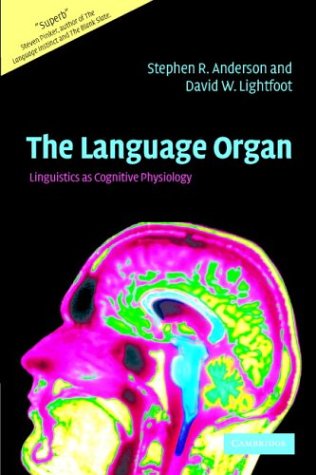

Most ebook files are in PDF format, so you can easily read them using various software such as Foxit Reader or directly on the Google Chrome browser.
Some ebook files are released by publishers in other formats such as .awz, .mobi, .epub, .fb2, etc. You may need to install specific software to read these formats on mobile/PC, such as Calibre.
Please read the tutorial at this link: https://ebookbell.com/faq
We offer FREE conversion to the popular formats you request; however, this may take some time. Therefore, right after payment, please email us, and we will try to provide the service as quickly as possible.
For some exceptional file formats or broken links (if any), please refrain from opening any disputes. Instead, email us first, and we will try to assist within a maximum of 6 hours.
EbookBell Team

4.1
60 reviews
ISBN 13: 9780521809948
Author: Stephen R Anderson, David W Lightfoot
The Language Organ treats human language as the manifestation of a faculty of the mind, a mental organ whose nature is determined by human biology and whose functional properties should be explored just as physiology explores the functional properties of physical organs. It surveys the nature of the language faculty in its various aspects: the systems of sounds, words, and syntax, the development of language in the child and historically, and what is known about its relation to the brain. It discusses the kinds of work that can be carried out in these areas that will contribute to an understanding of the human language organ. This book will appeal to students and researchers in linguistics, and is written to be accessible to colleagues in other disciplines dealing with language as well as to readers with an interest in general science and the nature of the human mind.
1 Studying the human language faculty
1.1 Linguistics and the mind/brain
1.2 Linguistics as history
1.3 Linguistics as the study of E-language
1.4 Linguistics as the study of I-language
2 Language as a mental organ
2.1 We know more than we learn
2.1.1 Two grammatical puzzles
2.1.2 Where does this knowledge come from?
2.2 The nature of grammars
2.3 Back to the puzzles
2.4 The acquisition problem
2.4.1 The poverty of the stimulus
2.4.2 The analytical triplet
2.4.3 Real-time acquisition of grammars
2.5 Conclusion
3 Syntax
3.1 The emergence of syntax within linguistics
3.2 Successive merger and deletion
3.2.1 Delete that
3.2.2 Deleting copies
3.2.3 Incorporating deleted items
3.2.4 Understanding some diversity
3.3 Case
3.3.1 Morphological case
3.3.2 Case theory
3.3.3 Links between morphological case and abstract Case
3.4 Conclusion
4 Sound patterns in language
4.1 Phonetics as theory
4.2 Phonology: language-particular structure
4.2.1 Phonological representations
4.2.2 Relating phonological and phonetic form
4.2.3 Morphophonemic representations
4.3 Morphophonemics and I-language
5 Describing linguistic knowledge
5.1 Phonological knowledge as it appears in borrowing
5.2 Can rules express phonological knowledge?
5.3 Constraint-based theories of phonological knowledge
5.3.1 Constraints vs. rules: patterns vs. effects
5.3.2 An example: voice assimilation
5.4 The extension of constraint-based description
6 Phonetics and the I-linguistics of speech
6.1 Representations and the study of sound structure
6.2 A linguistic basis for phonetic representation
6.2.1 Measurable but "unintended" effects
6.2.2 Intended effects hidden from observation
6.2.3 Discreteness of phonetic dimensions
6.2.4 Timing effects
6.3 Speech microprosody: a research program
6.4 Conclusion
7 Morphology
7.1 The lexicon
7.2 Words and "morphemes"
7.2.1 Monotonicity in word formation
7.2.2 The solidarity of form and content
7.2.3 Directionality in word formation
7.3 Productivity
7.4 Conclusions about lexical organization
8 Language change
8.1 Long-term directionality in the twentieth century
8.2 Grammars and time
8.3 English auxiliary verbs
8.4 Syntactic effects of the loss of case
8.5 Chaos
9 "Growing" a language
9.1 Principles of Universal Grammar: active early
9.2 New phenomena
9.3 Experimental technique
9.4 Nature of the trigger
9.5 Acquiring sound patterns
9.5.1 Children’s early knowledge
9.5.2 Birds’ development of song
9.6 Conclusion
10 The organic basis of language
10.1 Only humans have language organs
10.2 Language is a function of the brain
10.2.1 Language localization in the brain
10.2.2 Studying the functional anatomy of language
10.3 Language is a particular faculty
10.4 Conclusions
References
this is the same genetic language in all organisms
the language used in naming organisms
what are the organs of speech in english language
what is the official language of shanghai cooperation organisation
official language of the united nations organisation
the organization of natural language understanding systems
Tags: Stephen R Anderson, David W Lightfoot, Organ, Linguistics